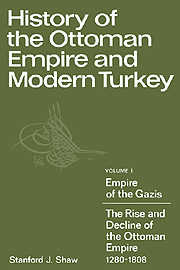Book contents
- Frontmatter
- Contents
- Preface
- Abbreviations
- Note on Pronunciation
- Map of the Growth of the Ottoman Empire to 1683
- Part One Rise of the Ottoman Empire, 1280–1566
- 1 The Turks in History
- 2 The First Ottoman Empire, 1280–1413
- 3 Restoration of the Ottoman Empire, 1413–1451
- 4 The Apogee of Ottoman Power, 1451–1566
- 5 The Dynamics of Ottoman Society and Administration
- Part Two Decentralization and Traditional Reform in Response to Challenge
- Map of the Decline of the Ottoman Empire, 1683–1924
- Bibliography: Ottoman History to 1808
- Index
1 - The Turks in History
Published online by Cambridge University Press: 02 February 2010
- Frontmatter
- Contents
- Preface
- Abbreviations
- Note on Pronunciation
- Map of the Growth of the Ottoman Empire to 1683
- Part One Rise of the Ottoman Empire, 1280–1566
- 1 The Turks in History
- 2 The First Ottoman Empire, 1280–1413
- 3 Restoration of the Ottoman Empire, 1413–1451
- 4 The Apogee of Ottoman Power, 1451–1566
- 5 The Dynamics of Ottoman Society and Administration
- Part Two Decentralization and Traditional Reform in Response to Challenge
- Map of the Decline of the Ottoman Empire, 1683–1924
- Bibliography: Ottoman History to 1808
- Index
Summary
Before examining the rise of the Ottoman Empire we must try to find out who the Ottomans were and how they came to western Anatolia in the first place.
Turkish Origins
The Ottomans descended from the mass of nomads who roamed in the area of the Altai Mountains, east of the Eurasian steppes and south of the Yenisei River and Lake Baikal in lands that today are part of Outer Mongolia. These Altaic nomads had a primitive, mobile civilization based on tribal organization, customs, and social sanctions without the formal organs of government and laws characteristic of more advanced societies. Their livelihood came mainly from raising flocks and taking what they could from their weaker neighbors. Temporary leadership was entrusted to hans, but the scope of their authority was limited to searching for pastures and to military activities and did not extend to relations among individuals within the tribes or among the tribes themselves. Their Shamanistic beliefs involved worship of the elements of nature through a series of totems and spirits considered to have special powers that could affect man for both good and evil. Man himself was helpless in the face of their power but could secure protection through the intercession of shamans, priests with special power to control and use the spirits. It was a simple religion of fear in which the dark elements of nature as interpreted by the shamans rather than the moral considerations of higher religions were the accepted determinants of right and wrong, and the nomadic way was considered the ideal of human existence.
- Type
- Chapter
- Information
- History of the Ottoman Empire and Modern Turkey , pp. 1 - 11Publisher: Cambridge University PressPrint publication year: 1976
- 1
- Cited by



